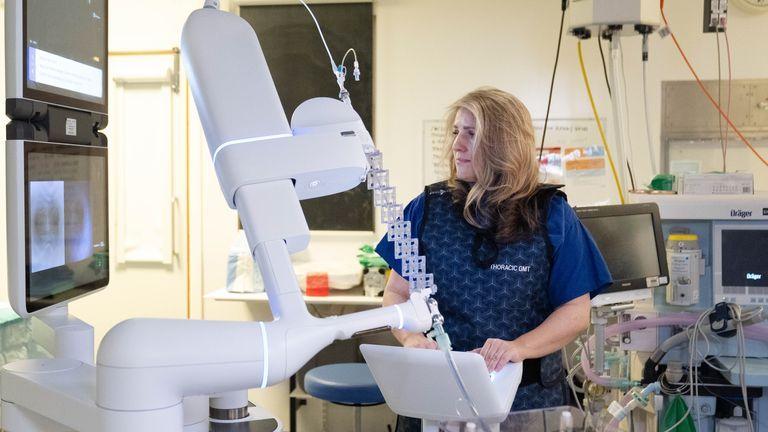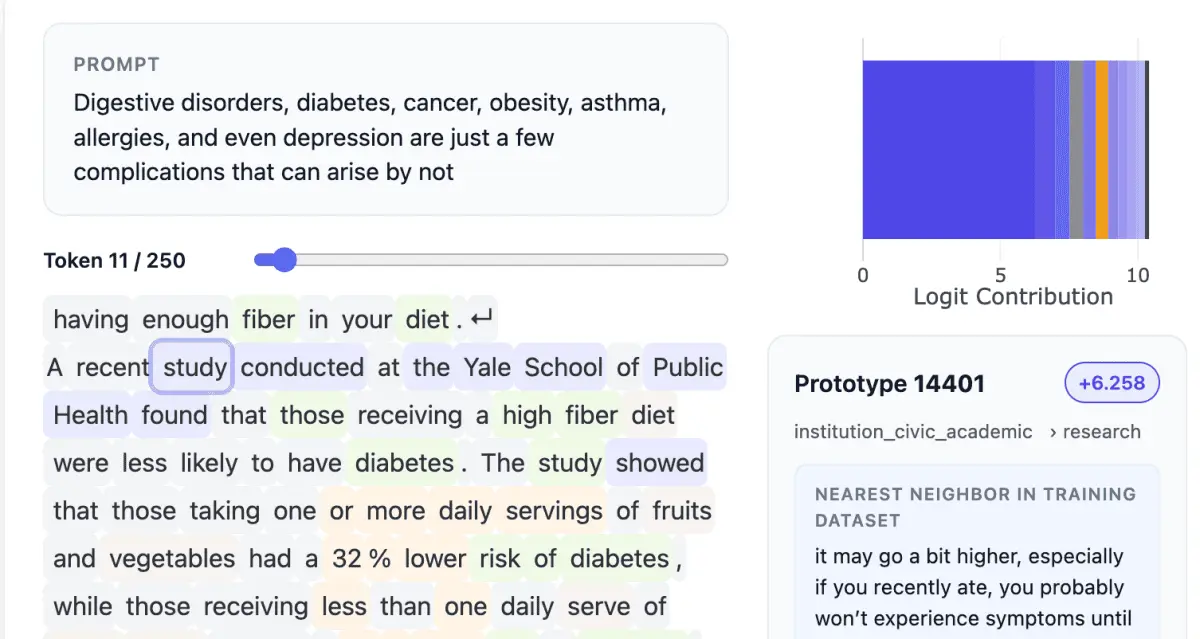AI Breakthrough in Lung Cancer Screening: Reducing Radiologist Workload by 79%
2 Sources
2 Sources
[1]
AI successfully reduces workload in lung cancer screening
University of LiverpoolMar 4 2025 A new study by researchers from the University of Liverpool and the Research Institute for Diagnostic Accuracy, Netherlands, has demonstrated that artificial intelligence (AI) can significantly improve the efficiency of lung cancer screening. Published in the European Journal of Cancer, the study reveals that AI can accurately rule out negative low-dose CT (LDCT) scans, potentially reducing the workload of radiologists by up to 79%. Lung cancer affects more than 48,000 people in the UK every year, and early detection is crucial for improving survival rates. The UK Lung Cancer Screening (UKLS) trial has already shown that LDCT screening can save lives by detecting lung cancer in high-risk individuals before symptoms appear. In this latest study, researchers tested an AI tool developed by Coreline Soft, Co Ltd., South Korea, using UKLS trial data. The AI successfully identified scans without significant lung nodules -- representing the majority of cases -- even among high-risk individuals. This allows radiologists to focus their expertise on cases that require further analysis, improving efficiency while maintaining accuracy in lung cancer detection. A key finding of the study is that all confirmed lung cancer cases were among the scans flagged by the AI for further review. This ensures that no cancers were missed while significantly reducing the number of scans requiring manual assessment. The study's success was made possible by the high-quality radiology reporting from the UKLS trial and long-term follow-up data, which provided a reliable dataset for AI validation. Implementing low-dose CT screening for lung cancer is highly beneficial, but it comes with logistical and financial challenges. Our research suggests that AI could play a crucial role in making screening programs more efficient while maintaining diagnostic confidence." Professor John Field, lead author and Professor of Molecular Oncolog, University of Liverpool Co-lead author Professor Matthijs Oudkerk, Professor Emeritus of Radiology at the University of Groningen, Chief Scientific Officer of the Institute for Diagnostic Accuracy added: "This is the first chest AI validation study performed in a real-world consecutive lung cancer screening program, with histological proven outcomes of lung cancer and a more than 5-years follow-up for disease free survival. Therefore, a milestone for further AI validation in terms of methodology and accuracy with results that can be translated to medical implementation." Lung cancer screening programs are expanding worldwide, and AI-driven tools like the one tested in this study has the potential to be instrumental in optimising healthcare resources, reducing costs, and ensuring timely diagnoses. Further research and validation studies will help refine these AI models. University of Liverpool
[2]
AI successfully reduces workload in lung cancer screening
A study by researchers from the University of Liverpool and the Research Institute for Diagnostic Accuracy, Netherlands, has demonstrated that artificial intelligence (AI) can significantly improve the efficiency of lung cancer screening. Published in the European Journal of Cancer, the study reveals that AI can accurately rule out negative low-dose CT (LDCT) scans, potentially reducing the workload of radiologists by up to 79%. Lung cancer affects more than 48,000 people in the UK every year, and early detection is crucial for improving survival rates. The UK Lung Cancer Screening (UKLS) trial has already shown that LDCT screening can save lives by detecting lung cancer in high-risk individuals before symptoms appear. In this latest study, researchers tested an AI tool developed by Coreline Soft, Co Ltd., South Korea, using UKLS trial data. The AI successfully identified scans without significant lung nodules -- representing the majority of cases -- even among high-risk individuals. This allows radiologists to focus their expertise on cases that require further analysis, improving efficiency while maintaining accuracy in lung cancer detection. A key finding of the study is that all confirmed lung cancer cases were among the scans flagged by the AI for further review. This ensures that no cancers were missed while significantly reducing the number of scans requiring manual assessment. The study's success was made possible by the high-quality radiology reporting from the UKLS trial and long-term follow-up data, which provided a reliable dataset for AI validation. Professor John Field, lead author and Professor of Molecular Oncology at the University of Liverpool, emphasized the study's importance, "Implementing low-dose CT screening for lung cancer is highly beneficial, but it comes with logistical and financial challenges. Our research suggests that AI could play a crucial role in making screening programs more efficient while maintaining diagnostic confidence." Co-lead author Professor Matthijs Oudkerk, Professor Emeritus of Radiology at the University of Groningen, Chief Scientific Officer of the Institute for Diagnostic Accuracy added, "This is the first chest AI validation study performed in a real-world consecutive lung cancer screening program, with histological proven outcomes of lung cancer and a more than 5-years follow-up for disease free survival. Therefore, a milestone for further AI validation in terms of methodology and accuracy with results that can be translated to medical implementation." Lung cancer screening programs are expanding worldwide, and AI-driven tools like the one tested in this study has the potential to be instrumental in optimizing health care resources, reducing costs, and ensuring timely diagnoses. Further research and validation studies will help refine these AI models.
Share
Share
Copy Link
A groundbreaking study reveals that AI can significantly improve lung cancer screening efficiency by accurately identifying negative CT scans, potentially reducing radiologists' workload by up to 79% while maintaining diagnostic accuracy.

AI Revolutionizes Lung Cancer Screening Efficiency
A groundbreaking study conducted by researchers from the University of Liverpool and the Research Institute for Diagnostic Accuracy, Netherlands, has demonstrated the potential of artificial intelligence (AI) to significantly enhance the efficiency of lung cancer screening. Published in the European Journal of Cancer, the research reveals that AI can accurately identify negative low-dose CT (LDCT) scans, potentially reducing radiologists' workload by up to 79%
1
2
.The Importance of Early Detection
Lung cancer affects over 48,000 people annually in the UK, making early detection crucial for improving survival rates. The UK Lung Cancer Screening (UKLS) trial has previously shown that LDCT screening can save lives by detecting lung cancer in high-risk individuals before symptoms appear
1
2
.AI Tool Development and Testing
The study utilized an AI tool developed by Coreline Soft, Co Ltd., South Korea, and tested it using UKLS trial data. The AI successfully identified scans without significant lung nodules, which represent the majority of cases, even among high-risk individuals. This allows radiologists to focus their expertise on cases requiring further analysis, improving efficiency while maintaining accuracy in lung cancer detection
1
2
.Key Findings and Implications
A crucial finding of the study is that all confirmed lung cancer cases were among the scans flagged by the AI for further review. This ensures that no cancers were missed while significantly reducing the number of scans requiring manual assessment. The study's success was made possible by the high-quality radiology reporting from the UKLS trial and long-term follow-up data, which provided a reliable dataset for AI validation
1
2
.Related Stories
Expert Perspectives
Professor John Field, lead author and Professor of Molecular Oncology at the University of Liverpool, emphasized the study's importance: "Implementing low-dose CT screening for lung cancer is highly beneficial, but it comes with logistical and financial challenges. Our research suggests that AI could play a crucial role in making screening programs more efficient while maintaining diagnostic confidence"
1
2
.Co-lead author Professor Matthijs Oudkerk, Professor Emeritus of Radiology at the University of Groningen and Chief Scientific Officer of the Institute for Diagnostic Accuracy, added: "This is the first chest AI validation study performed in a real-world consecutive lung cancer screening program, with histological proven outcomes of lung cancer and a more than 5-years follow-up for disease-free survival. Therefore, a milestone for further AI validation in terms of methodology and accuracy with results that can be translated to medical implementation"
1
2
.Future Implications and Research
As lung cancer screening programs expand worldwide, AI-driven tools like the one tested in this study have the potential to be instrumental in optimizing healthcare resources, reducing costs, and ensuring timely diagnoses. Further research and validation studies will help refine these AI models, potentially revolutionizing the field of lung cancer screening and early detection
1
2
.References
Summarized by
Navi
[1]
[2]
Related Stories
Recent Highlights
1
Google Gemini 3.1 Pro doubles reasoning score, beats rivals in key AI benchmarks
Technology

2
Pentagon Summons Anthropic CEO as $200M Contract Faces Supply Chain Risk Over AI Restrictions
Policy and Regulation

3
Canada Summons OpenAI Executives After ChatGPT User Became Mass Shooting Suspect
Policy and Regulation








